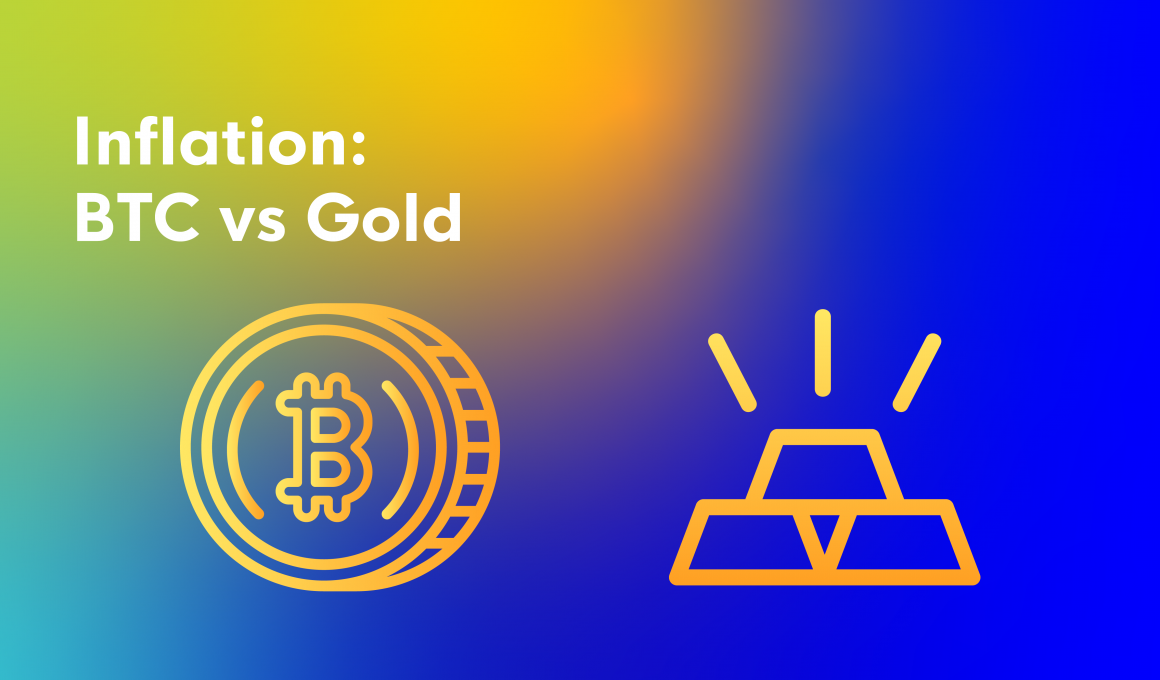Bitcoin’s rapid push to the mid $20,000 has holders ecstatic. Institutions like Grayscale and Paypal getting involved is often cited as the reason for the previous 160% pump.
To fight the implications of the Covid pandemic, global monetary policy is led by turning the printing presses on. Articles about inflation with images from the Weimar Germany in the 1920’s and even the US Confederacy in the 1860’s, are prompting investors to look for alternatives to hedge. This creates an environment in which gold AND Bitcoin are going up, albeit gold by 20%.

Children playing with stacks of hyperinflated currency during the Weimar Republic, 1922. Source: Rarehistoricalphotos
How exactly does gold protect against inflation, a power seemingly exclusive to it? Is Bitcoin a viable digital alternative?
The answers to these questions are interconnected. More importantly they will help you gain confidence in your strategy and allow you to design a solid crypto portfolio you fully understand, Covid or no Covid, you don’t want to be trading and increasing exposure to assets that are feeble.
Gold and Inflation
Inflation is the decline of purchasing power of a given currency over time. Simply put you can buy less with your money over time, making them decrease in value. This is why printing money is seen as a premonition to inflation, although it is not always the case. Nor is inflation always caused by printing money. Soros once attacked the British Pound, and he is not the only investor to successfully reduce the value of a currency.
In case of inflation stocks are prone to volatility, making them a suboptimal option for investors wanting to plan for hedging against volatility.
Gold has a finite supply making it seem resilient to inflation shocks. Finite if plans to extract it from nearby asteroids does not work out.
If suddenly there is more money in circulation, gold should go up in price. Low interest rates have the same effect of driving investors to gold.
Treasuries are a viable low-risk alternative, but only if they have descent returns. For example, if inflation is 4%, and interest rates are 1% and you go with the bond, you will be losing 3% every year. In this case, as in 2020 gold may seem like a good choice.
Why always gold and not platinum or Pokémon Cards? It’s simply a social construct. Our civilisation is historically conditioned to assign value to it.

Source: Honey Kochphon Onshawee from Pixabay
It can be flaunted as jewellery, emperors used to be buried with gold, and it used to be used as a means of exchange. It does not corrode and it’s rare but not as rare as palladium or other precious metals, so there is enough to go around. Humanity made up its mind to value it thousands of years ago and it remains a practical choice.
Gold’s legacy as an inflation hedge holds true: In the eight years between 1974 and 2008 when U.S. inflation was high (defined as CPI inflation exceeding 5%) gold rose by an average of 14.9% in real terms, outperforming other assets such as bonds, equities, and even other commodities.
Enter Bitcoin
That’s all great about gold but transferring and storing it may be an issue. You’d need to get a safe and sending some overseas may be a complex, expensive ordeal. If only an anonymous person created a digital, un-hackable, decentralised, finite good that can travel quickly and be divided into bits. Oh, and if they might sprinkle some deflationary properties that would be grand!

Source: Eivind Pedersen from Pixabay
This is where we are at:
- 21 million in total
- No one needs to manage it
- Easy to transfer
With every halving the mining difficulty goes up, so the supply gets slashed as there is more Bitcoin in circulation.
Volatility was tanking the legitimacy of the new asset in the past, but as institutions are entering the space this concern seems to vane. Reports that investors are increasingly turning to Bitcoin over gold to hedge against inflation are already in.
Gold vs Bitcoin
While inflation can be caused by disasters or geopolitical turmoil, it can also be a part of a government’s policy like in the US in 2020. This makes a lot of Bitcoin afficionados reaffirm their loyalty to the decentralised asset: no one can decide to print more.
If previously you only had to decide if you’re on Keynes’ or Hayek’s side in the role-of-government discussion, now there is a raging debate if Bitcoin or gold is a better hedge against inflation.
It will come as no surprise that traditional economists are siding with gold. The biggest opponent (ok avid hater) remains Peter Schiff:
https://twitter.com/PeterSchiff/status/1333855434747359239?s=20
While Crypto Twitter responds in their own way:
The issue with Gold beyond logistics is that it can stay the same value for a very, very long time. In fact, when it topped $1,900 earlier in 2020, it was its longest winning streak since 2011.
So, if you are building an investment for 30 years and started in 1990, this is what your profits would look like compared to S&P500 and Dow Jones:

Source: Longtermtrends.net
Both indexes outperform gold’s +380% growth with +1032% and 1014%.
Yet Bitcoin is young and seen as risky. Since Nixon took USD from the gold standard the depreciation of 1 USD has been so rapid and drastic, that when things go sideways central banks must fire every canon they have. It’s known as the “Nixon Shock.” It is fair to say that this experiment with the USD is going on for half a decade. While Bitcoin’s “experiment” with decentralization is going on for 11 years.
So, let’s eliminate the initial stages of its existence and look at how much it has gained just in the past 5 years:

Performance of Gold Vs Bitcoin as of October 4, 2020, Source: kenyanwallstreet
In a sense Bitcoin has the potential to be a hedge against inflation like gold and a well preforming asset in prosperous times like equities. The swiss army knife of assets.
There is no question that investing heavily in Bitcoin would have been quite risky and certainly not a hedge in 2015. Yet the data points shown so far paint a clear picture: Bitcoin’s gains have been more than attractive, has it “matured” enough to be a hedge against inflation?
Has Bitcoin “graduated”?
At the end of 2020 this is the information that we have to work with:
- S&P Dow Jones Indices to launch cryptocurrency indexes in 2021
- In 2017 there was the notion that the bubble could pop, and prices could go to 0. In 2020 we know that there is a bottom and a price at which buyers are willing to enter again. We found that out in March 2020:

Source: TradingView
- Institutions are getting involved in Bitcoin and other cryptocurrencies as buyers. First Grayscale, now its pulling Guggenheim in the game.
- Gold proponents are accusing some of these institutions of potential manipulation:
- Investment banks like JP Morgan are boasting the potential, saying price could grow in the multiples.
- Retail investors are getting easier access to Bitcoin though providers like Cash App and PayPal.
- Bitcoin attempted to take down its previous all-time-high and now it’s ranging below it. This has not happened before, instead it was boom and bust.
- Central banks are investigating digital alternatives of their own crypto currencies.
- Inflation metrics are well positioned to prop up gold and Bitcoin.
We see Bitcoin ticking the boxes on becoming a safe-haven asset: liquidity, transparency, rarity, baseline value and declining volatility. The crucial question is what happens after the all-time-high? Will there be retail holders, selling aggressively after holding for 3 years? Or has institutional involvement done enough to stabilise the price and sustain vertical price discovery?
Conclusion:
The fact that gold would have an actual challenger in the safe-haven asset arena was unimaginable 20 years ago. Then Satoshi Nakamoto had an idea.
The advantage of gold is its multimillennial consistency. Its problem is low returns.
The advantage of Bitcoin is massive returns so far, based on a modern solution solving an old problem. The question of legitimacy from centralized agencies and government, remains to be resolved.
One of those problems is more likely to be solved than the other. Yet if you are looking at a pure, consistent hedge against inflation gold may be a great choice for you. You can even mix it up and invest in crypto currencies pegged to and backed by gold.
But ignoring everything that Bitcoin has done and how far it has come may keep you out of some substantial returns. 5 years ago it would be a pure risky bet to invest in Bitcoin, now it’s risky not to.
Start small, build up to what you’re comfortable with, but if this is the modern answer to age-old problem. Invest what you can afford to lose, knowing it’s a ticket to being a part of the parabolic growth.
The best thing would be using technology to protect yourself from steep drawdowns. Backtest your possible approach and see what kind of safeties you would need to keep in place for all conditions.
In the next piece we’ll look at other crypto currencies out there like ETH or XRP from this perspective and see if they are at peril of inflation.







